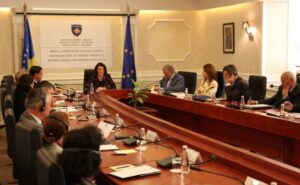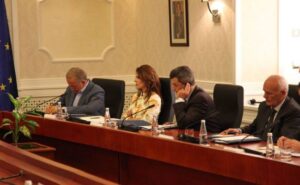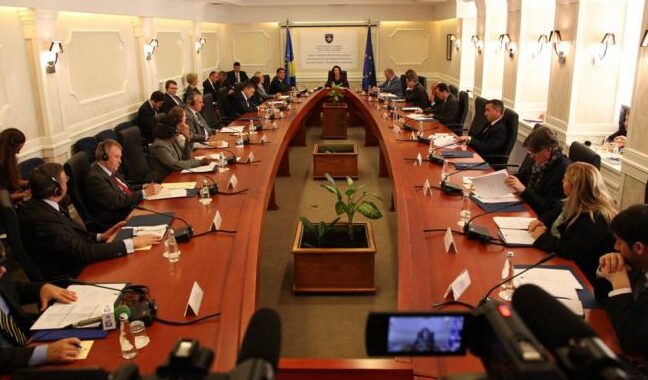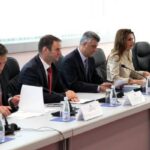

In this meeting, Minister Çitaku spoke on European Integration Strategy, starting of negotiations for Stabilisation and Association Agreement (SAA) and the Visa Liberalization process.
Find the full speech of Minister Çitaku in front of the National Council for European Integration:
The speech on European Integration Strategy
Honoured President,
Honoured representatives of Civil Society,
Ladies and Gentleman,
In March last year, National Council for European Integration at the inaugural meeting supported the initiative to establish a Task Force with the aim of drafting the European Integration National Strategy, as well as to develop comprehensive and sustainable consensus among all institutions and stakeholders of Kosovo.
In this regard, in May of the last year, we organized the first meeting of the Task Force for European Integration, whereas in July began Thematic Roundtable meetings which were led by civil society, but also by institutional representatives.
Within the Thematic Roundtable meetings attended more than 1000 participants. Among them were representatives of civil society, state institutions, representatives of political parties, and representatives of the academia and business community.
Also during these thematic roundtables were engaged a large number of local experts, who presented discussion materials. Such materials screened the situation in specific areas in the integration process. They were discussed and updated by the participants at the Thematic Roundtable meetings, in order to be finalized by the secretariat support.
All of this was conducted in more than 50 meetings and workshops which in most cases lasted for several days and in constructive atmosphere. The Epilogue is dozens of discussion materials, Thematic Roundtable Reports, Diagnostic Report as well as Draft Strategy that we have in front of us.
Ladies and Gentleman,
What makes this strategy unique are participants and contribution of all them who have participated in this process and unlike other strategies, this strategy is a local result that reflects challenges and prioritizes needs just as we see them.
This strategy also provides challenges, criteria, objectives and responsibilities that we have identified together, according to the identified priorities in the areas and sub-areas where we need to focus in the coming years in order to ensure an acceleration of the European agenda.
It is important to mention that, this strategy should serve as a framework for other sector strategies, and as such it identifies and prioritizes key issues related to all sectors.
Also, this strategy provides further governance development, drafting improvement and policies implementation, combating the organized crime and corruption, economic development and social cooperation, and regional and interstate cooperation.
Hence in other words, this strategy provides a broad list of responsibilities for all state and social structures.
The commitment of this entire spectrum, involvement of all stakeholders and cooperation offered to all without distinction, proves that when it comes to the European Integration agenda, the institutions and society in general has a unique stance and approach.
Regarding Government obligations, after today’s adoption of the Strategy in National Council, Ministry of European Integration, in cooperation with the OPM`s Strategic Planning Office will instruct all ministries that from now onward, each sector strategy should contain special section which will offer analysis on how the respective sector strategy will contribute on achieving the goals identified in the European Integration Strategy.
Also, the major part of the Strategy Objectives will be addressed through the review of the Action Plan for the Stabilisation and Association Agreement, which will be prepared by the Ministry of Integration by the end of this year.
Ladies and Gentleman
Please let me outline that it was a challenge and pleasure to coordinate the preparation of this strategy in cooperation with Mr. Lutfi Haziri and at the same time to thank all the participants who have contributed to the finalization of the document that we have in front of us today.
Thank you for your attention.
Speech for the negotiation of the Stabilisation and Association Agreement
Honoured President,
Honoured representatives of Civil Society,
Ladies and Gentlemen,
Starting the negotiations for Stabilisation and Association Agreement between the European Union and our country is a historic moment within the Integration process of our country.
Stabilisation and Association Agreement will be the first contractual agreement under which the Republic of Kosovo and the European Union will commit mutual commitments: on one hand, our country to undertake even deeper reform, and on the other hand, EU will provide real opportunities for membership.
The purpose of the SAA is; providing political and legal framework that will regulate the process of approximation and Kosovo’s membership in the European Union. The agreement will be legal basis for all subsequent steps of Kosovo in the process of European integration
It is encouraging that we have ahead of us an ambitious agenda for an agreement that will include all the traditional elements of the SAA as for the other countries in the region. We expect that the SAA has a framework timeframe for full implementation of the Association Agreement between the Republic of Kosovo and the European Union for a period of 10 years. This includes timeframe within which our agricultural products will be protected from foreign imports.
And I would like to clarify that this timeframe is not related to our European Union joining timeframe, because EU joining process will be determined based on the speed of undertaking reforms within the formal process of negotiations for membership. This Agreement will have legal status of international agreements, and will be a complex document -considering regional experiences such agreements had a volume of 500 to 800 pages.
A successful negotiation process requires a defined organizational hierarchy, simple procedures and clear, technical expertise and involvement of all political and social stakeholders, including the business sector, academia and civil society.
In this regard, on February 27, the Government of the Republic of Kosovo has established negotiating team.
Negotiation Team Leader is the Ministry of European Integration, while the members are:
– Minister of Foreign Affairs;
– Minister of Trade and Industry;
– Minister of Agriculture, Forestry and Rural Development;
– Minister of Finance;
– Minister of Economic Development;
– Minister of Justice
Also, in the negotiations will be invited one (1) representative of the Office of the President and the one from the Committee on European Integration of the Assembly of the Republic of Kosovo.
Other ministers and heads of independent institutions will participate depending on the matters set forth in the negotiations agenda.
Negotiating team will have a mandate to lead negotiations at the political level and to provide clear policy framework for technical negotiations.
Regarding the negotiators and negotiation working groups – so far we agreed with the European Commission that the negotiations will be organized in three working groups:
1. Working group on trade issues;
2. Working Group on approximation of legislation;
3. Working group on cooperation policies.
Negotiator on trade issues has been appointed Deputy Minister of Trade and Industry, Mr. Bernard Nikaj.
Negotiator for the approximation of legislation and policy cooperation is appointed Deputy Minister of European Integration, Mr. Gëzim Kasapolli
Negotiators will operate within the policy framework provided by the Negotiating Team and will have a mandate to discuss and negotiate all details of the proposed agreement.
Honoured,
We expect that the Stabilisation and Association Agreement negotiations to begin in the autumn of this year, and we intend to proceed with negotiations until the spring of next year.
In cooperation with the European Commission we have agreed on an intensive timetable of negotiations.
Within the negotiation process will be conducted 4 meetings on the level of Chief Negotiators – they will be held in October, November, February and May. In the meantime these meetings will be complemented with Working Groups meetings.
Negotiations will be developed by negotiating chapters, and initially the trade issues will be negotiated, then issues for approximation of the legislation and in the end policy cooperation. It should be noted that the starting of the negotiations finds our institutions prepared.
Now it has been 3 months that technical preparations have started in negotiating area of trade and approximation of legislation issues.
Regarding trade issues, the Ministry of Trade and Industry has done a good job within discussion with the business sector and finalizing the list of products that will be negotiated within the SAA.
Within the approximation of legislation, now all responsible institutions have finalized the first drafts of negotiation positions in these areas:
– Service Providing;
– Public procurement;
– Intellectual and industrial property rights;
– Free movement of capital;
-The right of establishment;
– Road transport;
– Protection of personal data;
– Services and electronic communication networks;
– Competition and state aid;
– Public enterprises, with special and exclusive rights.
The work performed during these 3 months and finalization of negotiation positions, would beginning of a more qualitative launch on negotiation process and protection of the citizens and businesses interests.
In the end, I would like to thank all involved institutions for the hard work done until now in preparation of the launch of negotiations for SAA.
Thank you for your attention.
Speech for Visa Liberalization Process
Honoured President,
Honoured representatives of civil society,
Ladies and Gentleman,
From 14 June 2012, when we received the Roadmap for Visa Liberalization, we have been engaged in the implementation of the criteria related with this process. Shortly after we have received the visa liberalization roadmap, the European Commission organized fact-finding missions that assessed the legislative and strategic framework, and implementation of criteria.
As a result of assessment missions, in February of this year, the European Commission published a report with recommendations which was incorporated in the action plan for visa liberalization.
During this time we held three meetings of High Officials of the European Commission and the Kosovo Government Officials called SOM, the same practice as with the countries of the region.
Moreover, during all this time, local institutions have reported at each meeting of senior officials for the achievements that have been undertaken during the reporting period. The legislative framework has been completed except a law that is still to be commented from EU officials. Also we have managed to draft all sublegal acts, complete the strategic framework and we also achieved concrete results in the implementation of all blocks for visa liberalization.
Furthermore we functionalized internal structures of our country where we have organized nine meetings of the Steering Committee for visa liberalization, a higher local forum which received full support of PM where key officials of institutions of the Republic of Kosovo have attended. These meetings are accompanied with technical-level meetings that have assessed and discussed the implementation of the criteria concerned.
If I’m allowed, I would like to stop on the blocks one by one, so that in the repatriation and reintegration, we have concrete results either on the implementation of bilateral agreements as well as on the reintegration of repatriated persons.
In this block we need a significant commitment of the municipal level, especially Municipal Officials for return and communities need to be more dynamic in completing works that belong to them and as another challenge remains the signature of readmission agreements with countries of origin such as Turkey, Pakistan, Afghanistan, Nigeria, Ivory Coast, etc, this is required under the criteria and local legislation applicable, where we take responsibility for the readmission of illegal migrants from other countries that use the Kosovo territory as transit territory to migrate illegally in another place, therefore we need to negotiate and to sign readmission agreements with these countries.
We have also achieved progress regarding security of documents; we already have an operator who supplies our country with biometric passports with the highest security in the region and beyond. As well preparations for issuing biometric ID cards have been completed and it is expected that in November of this year to start with their issuance.
In this block, the civil registries at municipal level remain a challenge, the application of the new system of civil status, full return of civil registry books located in Serbia where it has been some time since they began to return, but what should be done now is to digitalize these books and use them as means for verification of personal data whenever you have doubts on the accuracy of the personal data of our citizens.
There have been successes in the second block, respectively in Integrated Border Management and the management of migration and asylum. It is worth mentioning that Kosovo’s borders are now all under the control of the forces of the Republic of Kosovo, equipment and staff is established and existing agreements are being implemented without any major trouble.
However one of the biggest challenges lies right in this block which is illegal migration, as you may know, after signing the agreement on freedom of movement with Serbia, there was a huge influx of citizens of Kosovo towards the EU who used the territory of Serbia to reach their destination.
As a result these people ended up mostly in centres for foreigners in Hungary, it has been approximately estimated that about 5000 people have taken this dangerous path.
In order to address this phenomenon we have taken steps to increase the awareness of our citizens but also have taken actions to punish smugglers who have deceived the citizens and as a result there was a drastic reduction of the number in the second half of the year.
Honoured, this is a real challenge for visa liberalization process and we are more than confident that this challenge will be addressed in all relevant reports, whether if it is for European Integration such as the progress report , whether for visa liberalization or even in concrete reports on migration.
It is also worth mentioning that the implementation of the criteria in the second block, especially in IBM requires high cost of expenses because it needs specialized equipment and training to implement these criteria.
Regarding the third block which covers public order and safety is worth mentioning that this is the block with the largest and most complex number of criteria compared to other blocks.
Regarding the achieved progress it is worth mentioning that besides completion in large extent of legal and strategic framework in this block is also achieved progress in combating negative phenomena in which occasion:
• Only during the first half of 2013 were undertaken 69 police operations against human trafficking, were open 47 new cases, 32 identified victims of trafficking and 28 of them have received assistance.
• Strategy against narcotics trafficking is being implemented. During the first half of 2013 were undertaken 375 cases of narcotics trafficking, with 607 suspected persons and 382 arrests.
• During the first half of 2013, the Financial Intelligence Unit has opened 74 cases of suspected persons for money laundering activities and 14 are sent to the Prosecution. Also Agency for the Management of Confiscated and Sequestered Assets received 17 decisions on confiscation and sequestration and sold the confiscated assets through auctions.
With the initiative of the Prosecutorial Council it has commenced the development of the tracking registry (track record) containing data of corruption and organized crime cases. This mechanism is operational and is supported by an inter-institutional working group. This mechanism will ensure harmonized access to the categorization of offenses under the Criminal Code and will ensure that the data will be produced whenever the need arises; this is also one of the most important criteria of the block which is already completed.
Regarding the cooperation in law enforcement
We reached cooperation agreement on customs with these countries: Austria, Bulgaria, Hungary, Czech Republic, Germany, Ireland, Sweden, United Kingdom, Switzerland, Canada, the United States and Saudi Arabia.
So far the Government of Kosovo has signed agreements in the field of law enforcement with Austria, Sweden, Croatia, Albania, the Former Yugoslav Republic of Macedonia; agreement on combating trafficking in human beings with France and the former Yugoslav Republic of Macedonia; security agreement with Germany, and an agreement to combat organized crime and irregular migration with Hungary. Also in the process of negotiating are the agreements on police cooperation with Turkey, Switzerland and Estonia.
Kosovo police is making efforts to proactively examine opportunities for cooperation with European agencies for law enforcement, especially with EUROPOL. Thus, during 2013 KP has held four operational meetings with EUROPOL, while there are also being developed three joint investigations; and KP regularly participates in events organised by Europol.
Due to the impossibility for membership in EUROPOL and INTERPOL this will be one of the most difficult criteria feasible. However, it is recommended to continue with the maintenance and further development of contacts with these mechanisms, and where it is possible to deepen cooperation, particularly in operational terms.
Kosovo has concluded an agreement for mutual legal assistance with Croatia, Macedonia and Turkey; extradition agreement with Macedonia and Turkey, and the agreement on the transfer of sentenced persons in Belgium, Switzerland, Macedonia, and Turkey.
Negotiations with Germany, Italy and Albania, for mutual legal assistance, extradition and transfer of sentenced persons have been completed, while the agreement was signed with Italy in June 2013. Also, is being continued with the negotiation of agreements on judicial cooperation in criminal matters with Montenegro and Slovenia, while negotiations with Hungary, Austria, Bulgaria and Qatar will begin soon. Kosovo offered to 23 other countries to negotiate further agreements.
Regarding the fourth block, respectively freedom of movement and respect for the rights of communities it is of worth mentioning that freedom of movement within the territory of Kosovo is not problematic, except in the north. The situation in the north is politically charged and it depends entirely on the consequences of political dialogue. The government is in the process of dialogue and is believed that solving problems in the north will gradually contribute to freedom of movement throughout Kosovo.
Ethnically motivated crimes are being investigated by the Kosovo authorities. According to statistics of the Kosovo Judicial Council, in 2012, 3 cases of interethnic crimes were processed, from which 1 is resolved and 2 are still in process. While during the first quarter of 2013 are processed 5 cases of ethnically motivated crimes, 2 of which are inherited. As for the cases investigated by the Departments of General Crimes and Serious Crimes of Basic Prosecution, they have received a total of 5 penal charges, and as inherited are 3 penal charges.
Within the efforts for ensuring minorities and preventing these incidents, Municipal Councils for Community Safety, as consultative bodies within municipalities are active in 32 municipalities and inactive in 5 municipalities, especially in municipalities with Serbian majority community such as the ones in the north, Shterpce and Ranillug. As a challenge in this block remains providing a non-discriminatory atmosphere for all communities, not only to those ethnic, gender or religious but also for other communities such as LGBT community. Especially in this aspect the country’s institutions should investigate and discover the incident vandals Kosova 2.0 and increase awareness on anti-discrimination of each community.
Ladies and gentlemen, I apologize if it lasted more than you expected, but the liberalization process is complex and voluminous. As I said earlier, we are waiting assessment missions who have made their first assessment a year ago, which means 3 months after we have received the Roadmap, but now we are ready and expect a new round of assessment of criteria implementation impartially and in principles of meritocracy.
Last modified: August 16, 2022











… [Trackback]
[…] Read More to that Topic: integrimievropian.rks-gov.net/en/the-fifth-meeting-of-national-council-for-european-integration-took-place/ […]
… [Trackback]
[…] Here you will find 36283 more Information on that Topic: integrimievropian.rks-gov.net/en/the-fifth-meeting-of-national-council-for-european-integration-took-place/ […]
… [Trackback]
[…] Find More to that Topic: integrimievropian.rks-gov.net/en/the-fifth-meeting-of-national-council-for-european-integration-took-place/ […]
… [Trackback]
[…] Read More on that Topic: integrimievropian.rks-gov.net/en/the-fifth-meeting-of-national-council-for-european-integration-took-place/ […]
… [Trackback]
[…] Find More to that Topic: integrimievropian.rks-gov.net/en/the-fifth-meeting-of-national-council-for-european-integration-took-place/ […]
I was suggested this website by my cousin. I am not sure whether this post is written by him as no one
else know such detailed about my difficulty.
You’re wonderful! Thanks!
… [Trackback]
[…] Find More here on that Topic: integrimievropian.rks-gov.net/en/the-fifth-meeting-of-national-council-for-european-integration-took-place/ […]
… [Trackback]
[…] Information on that Topic: integrimievropian.rks-gov.net/en/the-fifth-meeting-of-national-council-for-european-integration-took-place/ […]
… [Trackback]
[…] There you will find 63513 more Info to that Topic: integrimievropian.rks-gov.net/en/the-fifth-meeting-of-national-council-for-european-integration-took-place/ […]
Muchas gracias. ?Como puedo iniciar sesion?
… [Trackback]
[…] Info on that Topic: integrimievropian.rks-gov.net/en/the-fifth-meeting-of-national-council-for-european-integration-took-place/ […]
… [Trackback]
[…] Read More here on that Topic: integrimievropian.rks-gov.net/en/the-fifth-meeting-of-national-council-for-european-integration-took-place/ […]